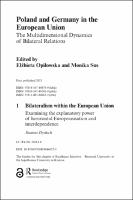Chapter 1 Bilateralism within the European Union
Proposal review
Examining the explanatory power of horizontal Europeanisation and interdependence
Abstract
This book explores the political and social dynamics of the bilateral relations between Germany and Poland at the at the national and subnational levels, taking into account the supranational dynamics, across different policy areas (trade, foreign and security policy, energy, fiscal issues, health and social policy, migration and local governance). By studying the impact of the three explanatory categories: historical legacy, interdependence and asymmetry on the bilateral relationship, the book explores the patterns of cooperation and identify the driving forces and hindering factors of the bilateral relationship. Covering the Polish-German relationship since 2004, it demonstrates in a systematic way, that it does not qualify as embedded bilateralism. The relationship remains historically burdened, asymmetric and thus it is not resilient to crises. This book will be of key interest to scholars and students of European and EU Politics, German politics, East/Central European Politics, Borderlands studies, and more broadly for international relations, history and sociology.
Keywords
Poland; Germany; EU; European Union; bilateral relations; cross-border cooperationDOI
10.4324/9781003046622-3ISBN
9780367490799, 9780367495619, 9781003046622Publisher
Taylor & FrancisPublisher website
https://taylorandfrancis.com/Publication date and place
2021Imprint
RoutledgeClassification
Politics and government


 Download
Download